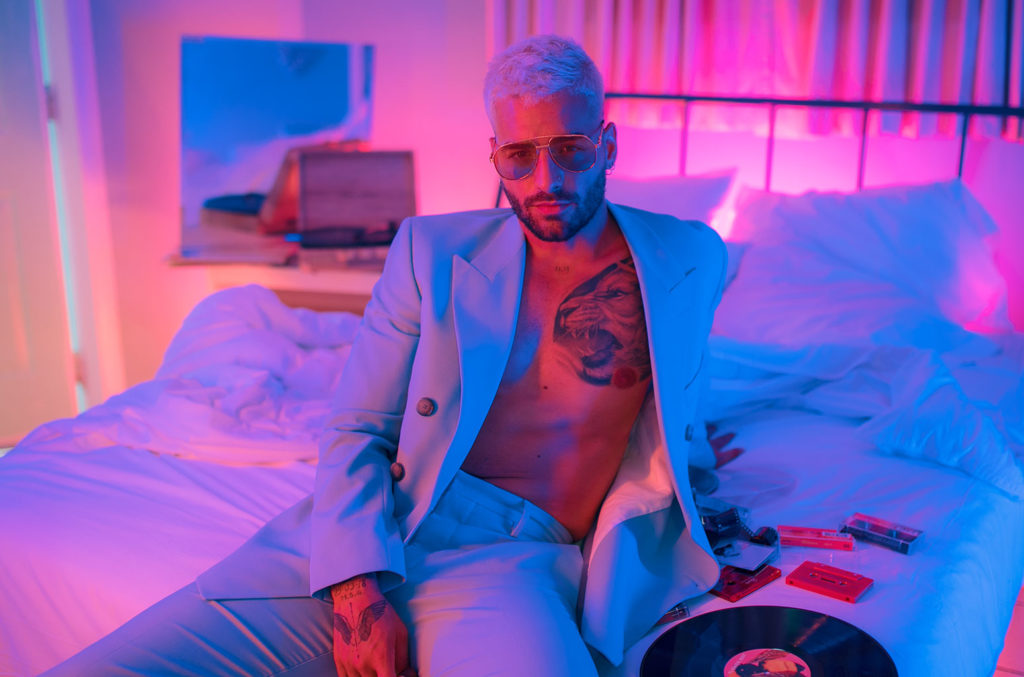Maluma Talks Stories Behind 5 Essential Tracks from ‘Papi Juancho’: Exclusive

On Aug. 19, in the thick of the second day of the Democratic National Convention, Maluma became a trending topic on Twitter. His Instagram, a formidable instrument with over 50 million followers, had gone dark.
Was it because ex Natalia Barulich was dating footballer Neymar? Or because Neymar dissed Maluma by posting a video of his team singing his new single “Hawái” –a breakup song—on Instagram?
Turns out Maluma was simply gathering steam prior to the surprise release of his new album, Papi Juancho, which dropped at midnight Aug. 21. Maluma recorded most of the set during the Covid-imposed lockdown with his longtime producer collaborators and co-writers The Rude Boyz (Kevin ADG and Chan “El Genio”).
“All I could do during lockdown in Medellin was work alone in my studio,” Maluma told Billboard in an exclusive interview. “That’s why this album has so much of my true essence; because I did so much of it alone.”
Papi Juancho, whose title riffs off Maluma’s nickname of “Juancho” (short for Juan Luis), features a handful of duets with old and new school reggaetón stars, from Ñejo y Dálmata to Myke Towers and Yandel. But the bulk is pure Maluma, ranging from romantic to raunchy street, experimenting with new, acoustic sounds and, as usual, boasting deceptively simply lyrics that evoke conversations with friends.
With 22 tracks, there are plenty of hits as well as hidden gems to choose from, so we asked Maluma to tell us the stories behind five of our favorite tracks on the set. As far as getting off Instagram, it wasn’t that hard, says Maluma.
“I needed it. It was like a detox. I only missed the fans.” The comeback was an Instagram Live at 11 p.m. Thursday, a prelude to the album release that, at its peak, was watched simultaneously by over 280,000 fans. And as a prelude to your listening, here are five essential tracks.
“Medallo City”: This was the last song (we got) done, but then one night, like at 2 a.m., I was with the Rude Boyz and we were listening to music by a Medellín musician named Teo Grajales. He’s from Envigado [the neighborhood] where I’m from. He’s been making music his whole life but he’s more underground. He does hip-hop but with more salsa in it. And I really identified with his music. I love hip-hop but I also love salsa; it was the perfect combination. Kevin called him and said, “Hey, Maluma wants to do a song.” At first he thought it was a joke. But by the next day, he sent us the song and the ideas and we added a few things.
[embedded content]
“Hawái”: This is one of my favorite tracks. It was written [by several of Maluma’s longtime collaborators] in a song camp in Hawaii. Then the song reached [songwriter/producer] Edgar Barrera and she showed it to me. I fell in love with the intro chorus and I wrote the verse. When I finished recording I called my management and said: “Boys, I have the first single.” And that was the beginning of this Papi Juancho project. It was one of the few songs I recorded before Covid. And it’s a very real song, very from the heart, with good lyrics, and good content. Truth is, I get bored of the same old reggaeton. It’s good to add lyrical content to the songs.
[embedded content]
“Vete Vete (feat. Ñejo y Dalmata)”: It’s special because Ñejo y Dálmata hadn’t done a song like this in a long time, and they were always a big source of inspiration for me. When I was little, I would sneak into all the sweet 15 parties to see them. One night, when I was around 14, I got into a party and I got on the stage with Ñejo. The security guard was going to kick me out, but he allowed me to stay up. I was so ballsy that he was wearing as gold earring—it was a gold treble clef—and I asked him if he would give it to me, and I did. That’s when my career started. I always remember him doing that. And because Papi Juancho is such a personal album, it’s like my personal playlist, I said, “We have to record something with Ñejo y Dálmata. He came and we recorded, and I asked him if he remembered giving me the hearing. He remembered everything. But all these years, he hadn’t realized that kid was me.
[embedded content]
“Madrid”: We wrote between Myke Towers, Edgar Barrera, Kevin, Chan and me. Initially, I wrote it but I felt we needed someone from the new generation in there. I think the strongest one is Myke Towers, and he got excited. He really brought it on. The song says, “I haven’t forgotten you since you left for Madrid.” It’s about loneliness and pain. The song was very high class, too sweet. And Myke really brought the street to it.
[embedded content]
“Cielo a un Diablo”: I like this song because it tells the truth. The guy is being totally honest. He asks her why she fell in love with him, if she knew how he was; she liked him because he was a bad boy. So he says, “Don’t ask a devil for heaven.” It’s a dark song, but it’s also very commercial and I’m sure many of us go through that. Me? I’m behaving now. I’m devoted to this album.
[embedded content]

Comments are closed.